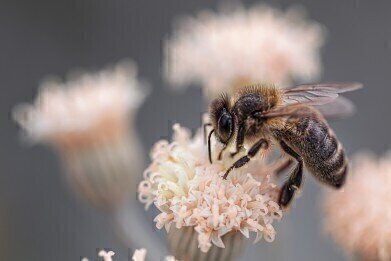Environmental Laboratory
Are We Too Dependent on Pollinators?
Aug 19 2019
Changing dietary habits may be creating an unhealthy dependence on crop pollinators, which could lead to a global food shortage. That’s the verdict of a new collaborative study between the United States and Germany, which looked at how trends in farming practices over the last half century are affecting the insects which pollinate crops, the use of land and the future of food security.
Their findings show that there has been a gradual shift away from staple crops which do not require pollination – such as corn, rice, soybeans and wheat – in favour of luxury ones which do, such as almonds, avocado, citrus fruits and coffee. As a result, more land is being occupied by less urgent crops which place greater demands on nature, thus jeopardising our food sources in an uncertain future.
Agricultural ordeals
Much of the debate surrounding farming focuses on the relationship between agriculture and water, as well as the amount of land being devoted to crop cultivation. While these are legitimate concerns which deserve attention, less research has been undertaken into how crop varieties may have a significant impact upon the conversation, especially those which require pollination.
Keen to rectify this wrong, scientists from the Martin Luther University in Halle-Wittenberg, Germany and the University of Maryland in the United States of America examined 50 years of data to see how farming practices have developed and the unforeseen consequences these developments have had on pollinators, land use and food security.
They found that between 1961 and 2016, the amount of land surface being devoted to agriculture has increased by 40.6%. However, in the same time period, the amount of land surface devoted to crops which require pollination has exploded by 137%. Indeed, of the top 20 fastest-growing crops in the world, 16 need the help of pollinators to flourish.
Lack of diversity
Given that global bee populations are undergoing an unprecedented decline at the moment (with addiction to pesticides one possible contributing factor), placing too many eggs in the pollinator basket is an unwise move. That’s especially true for parts of the world where a monoculture reigns supreme and a country’s economy is over-dependent on a certain kind of crop.
In places like Argentina, Bolivia, Brazil and Paraguay, for example, the national economy leans heavily on their soybean production, while something similar can be seen with palm oil cultivation in Indonesia and Malaysia. Should either of those crops endure a particularly torrid year (or years), it could result in a global food shortage and a crippled economy for the countries in question.
As a result, the authors of the study recommend eliminating monocultures and diversifying crop cultivation, as well as working towards regenerating key bee populations. “The bottom line is that if you're increasing pollinator crops, you also need to diversify crops and implement pollinator-friendly management,” explained David Inouye, co-author on the study.
Digital Edition
IET 34.2 March 2024
April 2024
Gas Detection - Biogas batch fermentation system for laboratory use with automatic gas analysis in real time Water/Wastewater - Upcycling sensors for sustainable nature management - Prist...
View all digital editions
Events
Apr 22 2024 Hannover, Germany
Apr 22 2024 Marrakech, Morroco
Apr 23 2024 Kuala Lumpur, Malaysia
Apr 23 2024 Kintex, South Korea
Apr 23 2024 Edmonton, AB, Canada


















